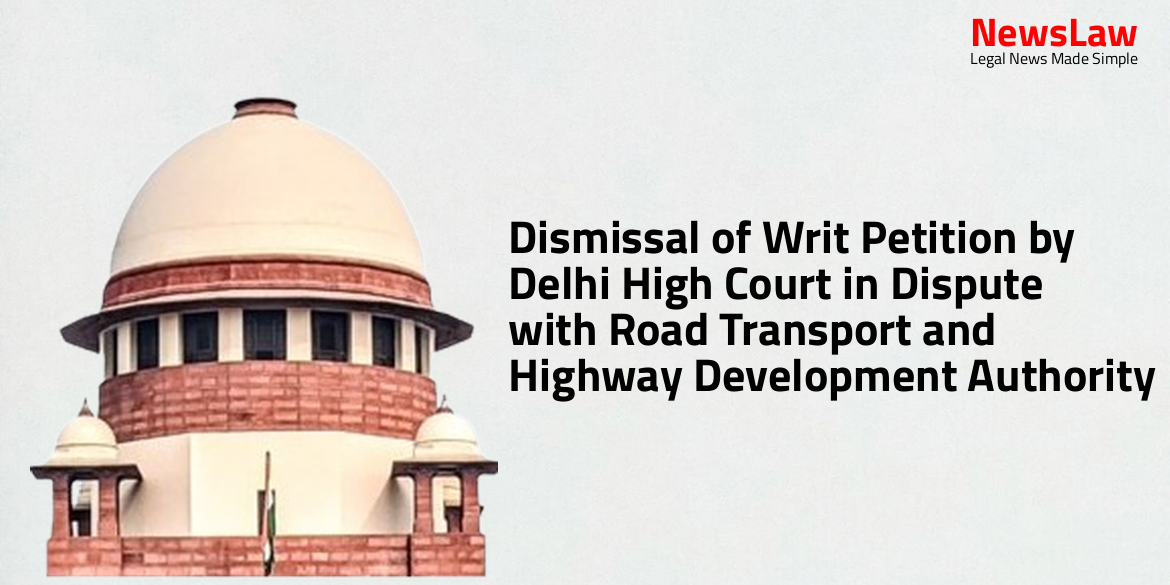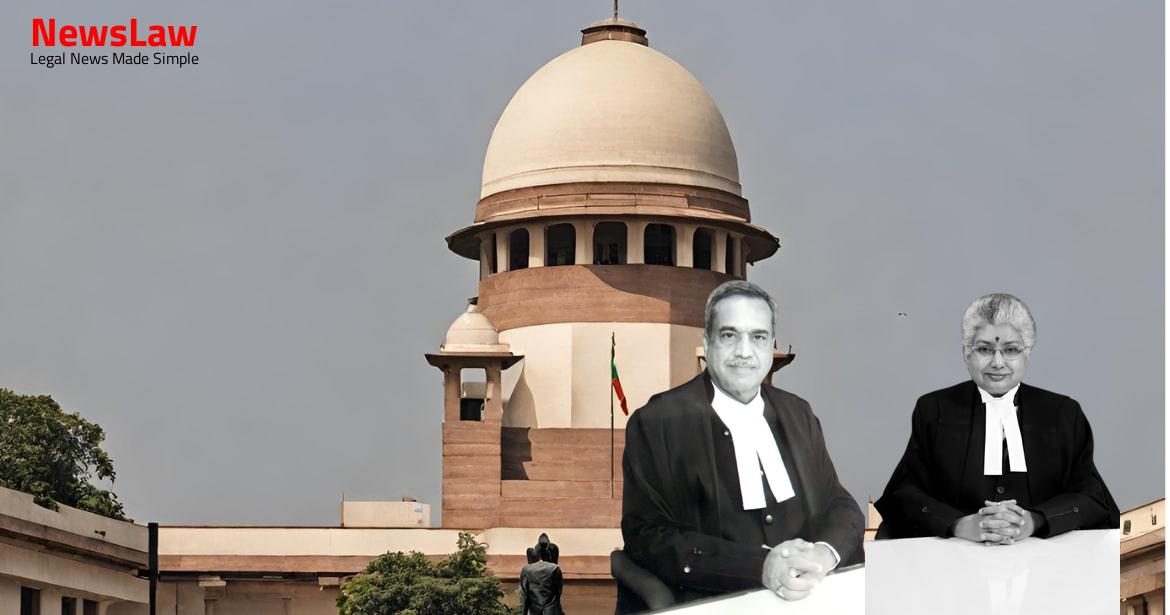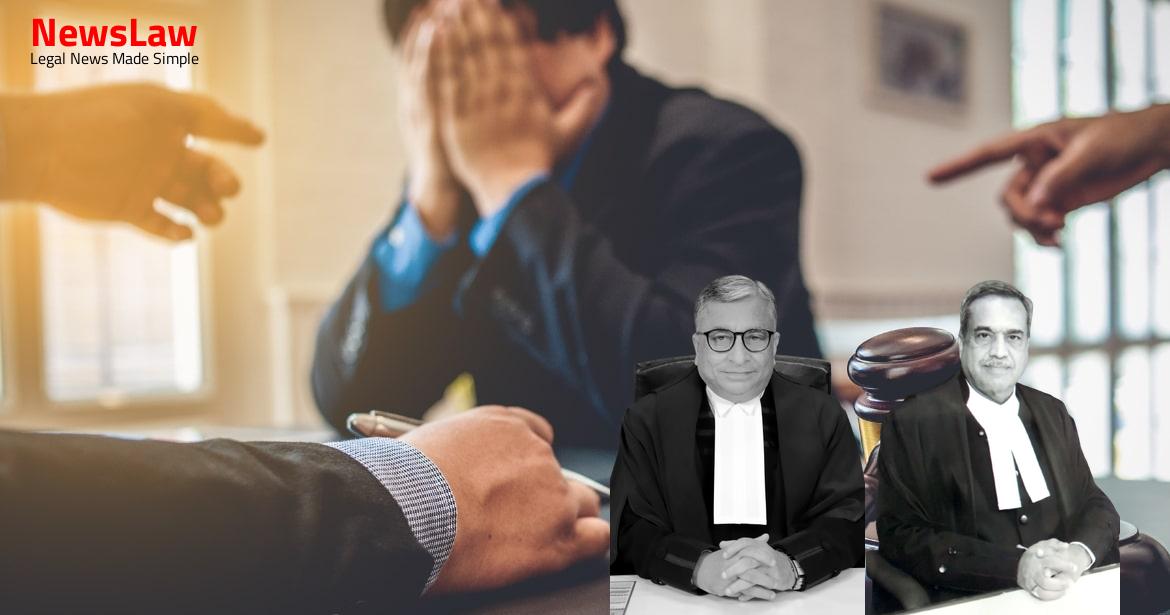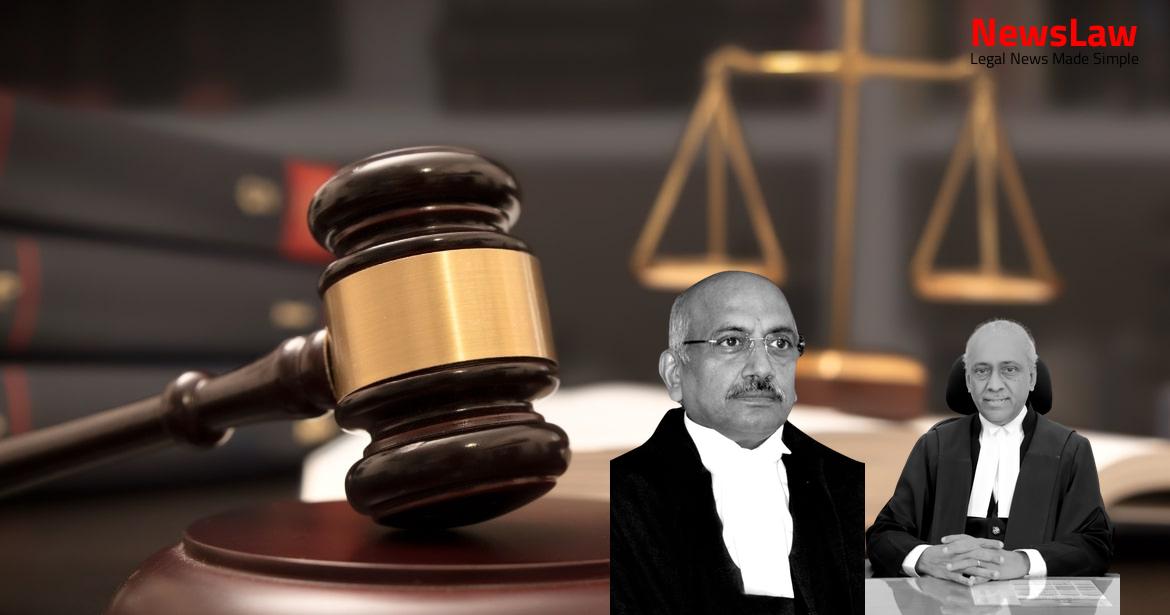In a recent ruling, the Delhi High Court has made a decision regarding a writ petition involving the Road Transport and Highway Development Authority. The petition sought to address a dispute related to a construction project in Sikkim. To learn more about the court’s decision and the implications of this case, read on for a summary of the judgment.
Facts
- The Petitioner was the successful bidder and was offered the work for the construction project in Sikkim.
- The Petitioner included its JV partners and promoters in the project.
- The work started after the bid price was accepted by the Respondent.
- The appointed date for the project was declared as 10.12.2020 with a completion timeline of 36 months.
- The project involved the construction of 2 laning with paved shoulder of a new Greenfield alignment in Sikkim.
- The Petitioner furnished the required performance security as per the bid document terms.
Arguments
- Counsel for the Petitioner argues that the Impugned Communication should be stayed until the Petitioner files an application under Section 9 of the Arbitration and Conciliation Act.
- The Respondent alleges that the Petitioner has been slow in completing the work.
- The Petitioner relies on the judgment in U.P. Power Transmission Corpn. Ltd. v. CG Power & Industrial Solutions Ltd., (2021) 6 SCC 15.
- Disputes have arisen between the Petitioner and the Respondent regarding the Right of Way (ROW) for the work.
- The Respondent claims that the Petitioner failed to ensure approval of designs and drawings from the Authority’s Engineer as per the RFP.
- The Petitioner argues that the existence of an arbitration clause does not prevent this Court from entertaining the writ petition.
- If the Impugned Communication is not stayed, the Petitioner could be barred from future contracts, amounting to civil death.
- The Respondent has raised questions about the maintainability of the writ petition due to the presence of an arbitration clause in the contract.
- The Impugned Communication is appealable before the Appellate Authority, which is the Secretary, Road Transport and Highway Development.
- The Respondent emphasized deficiencies on the part of the Petitioner, such as missing Design and Drawing of 3.340 km out of 4.470 km of viaducts, delayed achievement of project milestones, and low financial progress.
- Despite several opportunities and cure notices, no action has been taken by the Petitioner according to the Respondent.
- The Respondent asserts that the decision-making process has been fair and urges the Court not to exercise discretion under Article 226 of the Constitution of India.
Analysis
- Disputed questions of facts require evidence from both parties and are typically determined by a domestic forum chosen by the parties.
- High Court may entertain a writ petition even if alternative remedies are available, especially in cases involving fundamental rights, failure of natural justice, lack of jurisdiction, or challenge to the vires of an act.
- In this case, there are disputed questions of facts, but not all legal questions need to be withdrawn from arbitration, as the court has discretion under Section 34 of the Arbitration Act or Article 226 of the Constitution.
- The interim payment in the Dispute will be adjusted upon final settlement, with any balance amount due to be paid or returned with interest.
- The adjudication in the Dispute will not be final and binding until an appeal has been decided by an appellate tribunal or court of competent jurisdiction.
- The Communication dated 09.02.2024 is challenged in the present writ petition.
- Disputed questions of facts can only be established through oral and documentary evidence, not by evidence on affidavit alone.
- Discretion should not favor arbitration in matters where it is purely a question of law, such as the power of the Board to levy a surcharge.
- Disputes under the Agreement must be attempted to be resolved amicably through conciliation first.
- If conciliation fails, the matter shall be referred to arbitration.
- The awarded amount must be paid upon furnishing a bank guarantee.
- The Arbitral Tribunal will issue a final and binding Award.
- Both parties agree to carry out the Award without delay.
- An Award may be enforced against the parties and their assets.
- The Agreement remains in force until the Award is issued.
- Both parties must continue to fulfill their obligations during dispute resolution.
- If an Award is challenged in court, an interim payment of 75% must be made pending final settlement.
- Any disputes after the constitution of a regulatory authority will be adjudicated by that authority.
- Access to justice through public law remedy should not be denied in cases involving public law character even when there is an arbitration clause.
- Judicial review should not be exercised when there is an arbitration clause covering interpretation of the agreement and related clauses.
- Under the Arbitration and Conciliation Act, 1996, judicial intervention is limited in matters governed by the Act.
- Courts generally do not interfere when there is an alternative efficacious remedy available and parties have agreed to arbitration.
- The writ courts should refrain from exercising jurisdiction under Article 226 of the Constitution of India when there is an arbitration clause in place.
- Exceptions where the High Court may entertain a writ petition despite the availability of an alternative remedy include cases involving enforcement of fundamental rights, failure of natural justice, lack of jurisdiction, or challenge to the vires of an Act.
- Courts may not entertain a writ petition when there is an alternate efficacious remedy available to the petitioner.
- It is not appropriate for the Court to grant a stay on the operation of the Impugned Communication if the Court is not inclined to entertain the writ petition.
- The Court of competent jurisdiction under Section 9 of the Arbitration and Conciliation Act can decide the issue on the merits of the case, making it an alternate remedy.
- The Court is of the opinion that the petitioner has not been able to establish a prima facie case in their favor.
Decision
- The writ petition has been dismissed by the court.
- Any pending application(s) related to the writ petition are also dismissed.
- The decision is final and there is no further action to be taken.
Case Title: UP STATE BRIDGE CORPORATION LIMITED & ANR. Vs. NATIONAL HIGHWAYS AND INFRASTRUCTURE (2024:DHC:3739)
Case Number: W.P.(C)-3256/2024



